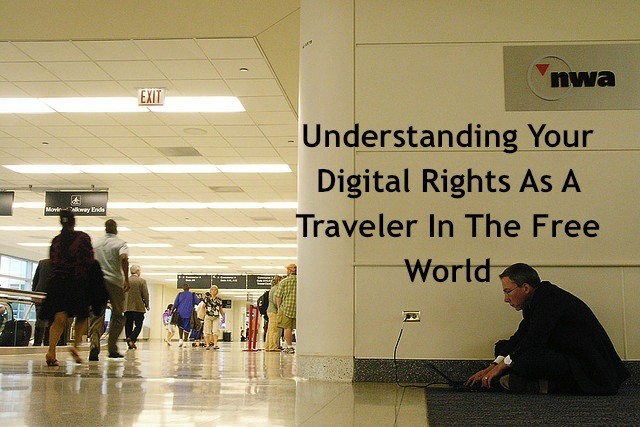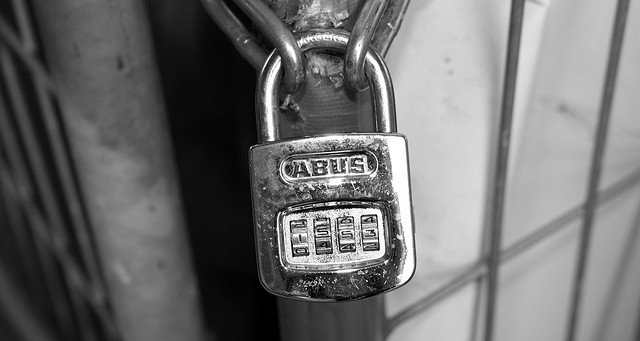When talking about Internet censorship or unwarranted laptop searches, most travelers’ greatest concerns are before heading to the Middle East, China, or parts of southeast Asia. Although many countries in these regions of the world (among others) are digitally restrictive to put it mildly, you might not know that the United States, most of the European Union, Australia are other democratic nations can leave your digital rights at the door border.

Maintaining your privacy isn’t about hiding things you shouldn’t be doing, it’s a fundamental human right that is often disregarded in the name of security. You might be thinking, “we’ll, I’ve got nothing to hide” but who watches the watchers – besides, wouldn’t you rather decide who sees your travel photos from Mexico?
“They who can give up essential liberty to obtain a little temporary safety, deserve neither liberty nor safety”. – Benjamin Franklin
 Why You Should Care
Why You Should Care
According to government figures, in the US alone, more than 6,800 electronics devices (mostly laptops and mobile phones) were confiscated, searched, or downloaded for further analysis upon entry into the country since 2009. Roughly half of those searched were US citizens, without probable cause nor authorized by a search warrant. However, all travelers entering the US and many other first-world democracies are subject to the same (lack) of restrictions. Though these are specific examples from the US, many other countries in the free world get around their legal privacy protections by using some version of the Supreme Court authorized “border search exception”.
Basically, this “allows searches of individuals and property entering the United States without probable cause or a warrant.” United States v. Ramsey, 431 U.S. 606 (1977).
You might be subject to a hard drive search the next time you land in London or Sydney and if you’re protecting computer before heading to Beijing, you’ll want to do the same for those places as well.
Your Passwords Don’t Mean A Thing
Even if you’re using one of these free programs to protect your data against thieves and governments, they won’t do you much good if you’re asked to give up a password. In places like New Zealand, Germany, the US and others you might not have expected, refusing to divulge your password can be equivalent to breaking the law and subject you to a fine, hassle, or a flight right back home.

This Friday I’ll teach you a number of ways to protect your (decent and those spring break college variety) travel photos – even within the 7 days some governments can legally confiscate your laptop…for no reason whatsoever.
 Protecting Traveler Rights
Protecting Traveler Rights
Some of you may be reading this and thinking I’m helping terrorists and child molesters fly around the world freely while dismissing world governments’ efforts to protect their citizens. The problem is that often digital border searches and electronic confiscations are done without justification or quite questionably in the free world – much like in places digitally weary travelers tend to focus on like China or Russia for example.
The legal slopes not in your favor as a traveler – more of our lives are on digital devices, and it’s increasingly easy to have your laptop or mobile phone scanned for further analysis after you leave the airport. Tomorrow, I’ll show you how to even the odds against any government that might decide to take your hard drive out for an unwarranted spin.
[photos by: juicyrai (man on laptop in airport), binaryCoco (padlock), hans s (scales)]












Wow, didn’t know about any of that. We’ve never had any of our stuff searched – or confiscated. Lucky us, it looks like. If my laptop was taken, I’d lose A LOT!
Julia
I’ve had a few laptop opens, turn on a program or two, and open up the documents folder kind of things but thankfully never a confiscation myself 🙂
Having my laptop confiscated is my biggest nightmare. Looking forward to this series.
There really should be clear cut regulations defining what constitutes a confiscation. Unfortunately hardly any country does, although the US now limits the time they can hold a laptop to 7 days. Still a very long time without a warrant or probable cause.
Interesting post, apparently in Europe they are looking at strengthening digital rights to protect Europeans from losing their personal information on sites like Facebook, will be interesting to see how it plays out.
Hopefully that will extend to airports as well, although it’s not likely the way things look now.
i didnt know about this before… my laptop was never taken or inspected before… thanks for sharing….
It’s unfortunate that this is the reality. Too many people are willing to give up their rights and freedoms in what appears to be security.
Interesting… Yes, from countless movies and tv series (even though they are fictions), I fully understand the possibility of being searched from the government. They are the big guys but still it’s not pleasant.
I think we always know the possibilities but just put that thought on the side. Thanks for the reminder and looking forward to read your series.
Not pleasant and if not warranted, I’d say quite disturbing. Especially in some of the countries listed above.
Interesting, and shocking. This never would have even crossed my mind before. Thanks for this!
A lot of these laws get passed quietly or on the waves of a security event. Glad I could help shed some light on it 🙂
Its sad that governments do what they do and this will happen forever. Thankfully I didn’t get checked on my visits to controversial countries like Russia and Israel. I have my operating system in an Indian language, I wonder if that would attract more attention and scrutiny; or maybe it works to an advantage? Thanks for the post Anil, its good to be reminded from time to time.
Difficult to say, I’ve heard that some people running Linux have had their laptops searched more often because it’s rather unfamiliar to most security officers. I’m guessing the Mac OS X is on your side!
Hmmm – looks like I need to add this to my list of things to research to prep for Mongol Rally. Thanks for sharing and bringing the subject to light. I’m curious – have you ever personally had your laptop ‘searched’ during your constant travels?
Nothing beyond popping open my laptop and opening up a few folders from the desktop (once I was asked to open Word). It’s happened a few times that I can recall.
I’ve been considering what to do to avoid the risk of search and/or confiscation next time I fly but haven’t quite decided yet. I use TrueCrypt but I also like the idea of using a basically data free device although a hidden TrueCrypt volume seems like a good way to look normal but still hide and protect your data.
Glad you’re spreading the word on this Anil. Hopefully fewer will be taken by surprise if they are searched.
Hidden folders are probably the best way to go. It’s extremely difficult to find them and being forced to give up a password only reveals the ‘fake’ encrypted folder.
It’s definitely important that people understand their rights are being revoked in the guise of security. Many of these ‘free’ countries have protections against unwarranted search and seizure – just because you’re at border control or that information is digital shouldn’t change that. We are otherwise sacrificing what many others in the past have fought so hard to obtain for us in the present.